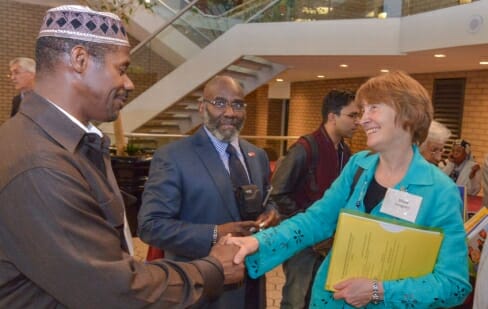 “Inculturation of faith is an intrinsic aspect of Christianity. This regards the difficult and complex processes that need time, and in this process the local people themselves are particularly important. By living the Gospel authentically, they who are already deeply rooted in their own cultures will draw forth those adaptations which they will then share with the others, through the customs, artistic expressions and mindsets of their own people. I am totally convinced that the important thing is God himself. This obviously does not mean that one can remain inactive or indifferent. Also we are gathering for example, the African proverbs or those of other peoples, and our publishing house has published books on the great religions. Chiara Lubich established a school for inculturation in Africa , after which she launched another one in Latin America. But whoever thinks that it would suffice to study the various cultures in order to make relate with the Gospel teachings, would be going down the wrong path. We have to bring God. He is the one open and fully ‘involved’ in what He himself created and He will be the one to achieve inculturation. Of course, there are many forms of inculturation and many attempts that should be encouraged and blessed. However, only God can achieve real inculturation. The greatest contribution we can give is love. If each one gives of himself, foregoing one’s own self in the other, and accepting the other in oneself, then the personality of each one will flourish at best and complete the personality of each one. The same would occur among peoples: if each people is able to “lose” its culture out of love, and open out to God in the other, the best of each culture would be “saved” and each would emerge and be enriched not only in the spiritual but also the humane, cultural, and ethnic aspects. Initially, the journey will be slow, but once the road has been paved, it will accelerate and bring enormous results.”
“Inculturation of faith is an intrinsic aspect of Christianity. This regards the difficult and complex processes that need time, and in this process the local people themselves are particularly important. By living the Gospel authentically, they who are already deeply rooted in their own cultures will draw forth those adaptations which they will then share with the others, through the customs, artistic expressions and mindsets of their own people. I am totally convinced that the important thing is God himself. This obviously does not mean that one can remain inactive or indifferent. Also we are gathering for example, the African proverbs or those of other peoples, and our publishing house has published books on the great religions. Chiara Lubich established a school for inculturation in Africa , after which she launched another one in Latin America. But whoever thinks that it would suffice to study the various cultures in order to make relate with the Gospel teachings, would be going down the wrong path. We have to bring God. He is the one open and fully ‘involved’ in what He himself created and He will be the one to achieve inculturation. Of course, there are many forms of inculturation and many attempts that should be encouraged and blessed. However, only God can achieve real inculturation. The greatest contribution we can give is love. If each one gives of himself, foregoing one’s own self in the other, and accepting the other in oneself, then the personality of each one will flourish at best and complete the personality of each one. The same would occur among peoples: if each people is able to “lose” its culture out of love, and open out to God in the other, the best of each culture would be “saved” and each would emerge and be enriched not only in the spiritual but also the humane, cultural, and ethnic aspects. Initially, the journey will be slow, but once the road has been paved, it will accelerate and bring enormous results.”
Excerpt from:Pasquale Foresi,Colloqui, New City Press 2009, pp.133-136. Collection of conversations with members of the Focolare Movement dated 1990/98




0 Comments